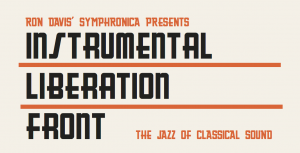The Instrumental Liberation Front: A Manifesto by Ron Davis
The Instrumental Liberation Front: A Manifesto
By Ron Davis (Instrumental Musician)
Instrumental music has gone missing. I’m not sure if it’s been abducted, suppressed or shrouded in a dark veil of neglect, but it’s become nearly invisible. Or rather, inaudible.
On the radio (with the rare exception of such mainstays as JazzFM). On the Internet. Certainly on television, where it used to have a constant presence. In old media. In new. It’s gone. Instrumental music is gone, or just about. Words and music, yes. Music alone, no. Text plus music, check. Music sans text, negative.
Instrumental music needs to be liberated. It needs to restored. Restored to its rightful place on culture’s stages.
We who love music need to make this happen. We must help carve a path of return for the many great instrumentalists alive today. For the jazzers. The classical musicians. The fingerpickers. The bluegrass guys. The composers. The arrangers. For them whose voice is a collection of notes. For all the musicians in all styles of instrumental music.
We need to liberate instrumental music. We need an Instrumental Liberation Front.
The history of western music is the history of the instrumental coexisting in harmony (ahem) with the vocal. A Beethoven symphony, a Verdi opera. A Scott Joplin rag, a Stephen Foster tune. Billie Holiday Strange Fruit, Duke Ellington Isfahan. The Beatles’ Let It Be, Herbie Hancock's Watermelon Man.
This instrumental-vocal coexistence ran right up until the 1980's. Before then, you could rely on finding instrumental tunes on the charts: Wipeout, Baby Elephant Walk, The Homecoming, even the much maligned Popcorn.
But then… commercial, Top 40, focus group-based, metric driven Command-and-Control McMusic started squeezing out instrumental music. There was more marketing juice in personalities than in notes. The musician was subordinated to the person (although we all know the artist is not the person). The music was subordinated to the text.
Consequence: popular music is now all vocal. No more instrumental. Scan the top playlists and charts: nada instrumentala.
What have we lost? Whole swaths of music styles and stylists. Deeply talented musicians who cannot make a living. Great players who have mastered their craft, but have no means to sustain themselves. Yesterday’s brilliant pianist is today’s divorce lawyer.
Not that there’s anything wrong with being a divorce lawyer. But, for crikey’s sake, if the world can expend so much energy in saving the Spotted Owl (Strix occidentalis), can it not step up for the instrumental musician (Melodious problematicus)?
Now, I’m not a disinterested advocate. I have skin in the game. I’m a jazz pianist. I don’t sing. I don’t write lyrics. If I want to wax lyrical, it’s via the notes on the keyboard.
But when I talk to colleagues who were active in the 60s and 70s, I am stunned by how much the level of engagement with jazz has diminished. Those guys were working all the time. My colleagues and I today are lucky to work a few times a week.
And it’s not that the music is any less great. In some ways, it’s never been better. Thanks to devoted operations like JazzFM, you can hear the stuff out there. It’s fabulous. Mike Downes, Tania Gill, Robi Botos, Lina Alemano… superb instrumentalists and composers, all.
Jazz players and fans do have to take some of the responsibility for the reduced attention we are getting. Jazz may have become too hermetic. Too specialized. Too heady.
But that’s not the root cause of current neglect. Classical, bluegrass, percussion and other instrumental forms are experiencing the same cricket-noises.
No. The musicians and the music do not bear the greater part of the blame. The music industry does. It has succeeded in marginalizing instrumental music. It has made no room for the new Charlie Parkers, David Sanborns, Ida Haendels, and Glenn Goulds.
This must change. Instrumental music must be allowed to graze again in the open minds of the public’s ears. We need to free instrumental music.
We need the Instrumental Music Liberation Front.



